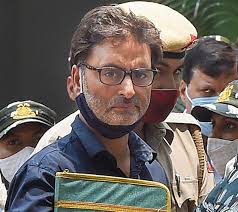Supreme Court Allows Virtual Cross-Examination Amid Controversy
New Delhi, 04 April 2025 – A Heated Legal Battle Unfolds
Jailed Jammu Kashmir Liberation Front (JKLF) chief Yasin Malik has made a bold declaration before the Supreme Court, asserting that he is a “political leader” and not a “terrorist.” Malik, who appeared via video conferencing from Tihar Jail, emphasized his history of engaging in dialogue with seven Indian Prime Ministers, including PV Narasimha Rao, Atal Bihari Vajpayee, and Manmohan Singh, as evidence of his political legitimacy.
The statement came during a hearing on the Central Bureau of Investigation’s (CBI) plea to transfer trials related to the 1989 kidnapping of Rubaiya Sayeed and the 1990 Srinagar shootout from Jammu to New Delhi. Malik is currently serving a life sentence under the Unlawful Activities (Prevention) Act (UAPA) for a separate case.
Malik’s Defense: A Political Narrative
Responding to the CBI’s argument that he posed a security threat, Malik firmly rejected the label of “terrorist.” He stated, “I am not a terrorist but a political leader. Seven Prime Ministers have engaged with me in the past. My organization has never been listed as a terrorist group under UAPA, and the FIRs against me are related to non-violent political protests.”
Malik also criticized the current government for reviving decades-old cases against him, claiming that this move violates a ceasefire agreement established in 1994. “The present dispensation has chosen to reopen 35-year-old cases, disregarding the spirit of the ceasefire,” he argued.
Supreme Court’s Ruling: Virtual Cross-Examination
The Supreme Court, while refraining from commenting on the merits of the case, ruled that Malik could cross-examine witnesses virtually from Tihar Jail. The bench, comprising Justices Abhay S Oka and Ujjal Bhuyan, cited security concerns and the availability of video conferencing facilities as reasons for denying Malik’s request for physical appearance in court.
The court emphasized that its decision was procedural and not a judgment on Malik’s claims or the allegations against him. “We are not deciding whether you are a terrorist or a political leader,” Justice Oka remarked during the hearing.
A Polarizing Figure: Public and Political Reactions
Malik’s statement has reignited debates about his role in Jammu and Kashmir’s political landscape. While his supporters view him as a symbol of political resistance, critics argue that his past actions cannot be separated from the region’s history of militancy.
The CBI, represented by Solicitor General Tushar Mehta, countered Malik’s claims, pointing to photographs allegedly showing him with known terrorists. “The ceasefire agreement has no relevance in the current legal proceedings,” Mehta asserted.
The Road Ahead: Legal and Political Implications
As the trials proceed, Malik’s case continues to draw national and international attention. The Supreme Court’s decision to allow virtual cross-examination marks a significant moment in the legal process, balancing procedural fairness with security concerns.
For Malik, the hearings represent an opportunity to reshape the narrative surrounding his political identity. For the government, the case underscores the complexities of addressing historical grievances while ensuring accountability.
Key Takeaways:
- Malik’s Assertion – Declares himself a political leader, not a terrorist, citing engagement with seven Prime Ministers.
- Supreme Court’s Decision – Allows virtual cross-examination, denying physical appearance in court.
- CBI’s Argument – Emphasizes security concerns and disputes the relevance of the 1994 ceasefire agreement.



